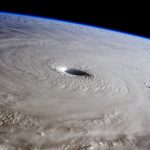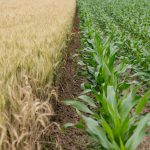 August 22, 2019 12:56 pm
Published by Climate Extremes
August 22, 2019 12:56 pm
Published by Climate Extremes
The Philippines is one of the most exposed countries in the world to tropical cyclones. In order to provide information to help the country build resilience and plan for a future under a warmer climate, researchers built on previous research to investigate implications of future climate change on tropical cyclone activity in the Philippines.
 August 14, 2019 11:39 am
Published by Climate Extremes
August 14, 2019 11:39 am
Published by Climate Extremes
The ARC Centre of Excellence for Climate Extremes has contributed to a new scientific study that reveals that extremely hot and cold temperatures, drought and heavy rainfall strongly affect the year-to-year variation in the total global yield of four important crops.
 August 2, 2019 8:57 am
Published by Climate Extremes
August 2, 2019 8:57 am
Published by Climate Extremes
The Coupled Model Intercomparison Project (CMIP6) Model Analysis Workshop was held in Barcelona from March 25-28, 2019, and provided the first opportunity for results from CMIP6 models to be discussed and presented by the modelling community.
July 22, 2019 3:20 pm
Published by Climate Extremes
City of Yarra, Yarra Libraries and the Ewing Trust present: How to Stay Engaged in a Climate Crisis Strategies from psychology and community activism Psychological science can help people come to terms with the implications of climate change so that they can stay engaged and be part of the collective action needed to restore a safe climate. Psychologist and researcher, Dr Susie Burke, will share some insights and provide strategies to help attendees more effectively engage with the climate crisis.... View Article
July 22, 2019 12:58 pm
Published by Climate Extremes
Join us for a presentation and panel discussion on ‘The Melbourne region Healthy Waterways Strategy’ as part of the University of Melbourne’s Water Security Series. As Melbourne’s population grows and climate change impacts increase, the waterways of the region will be put under greater stress. Efforts to improve water quality, ecologic function and the amenity value of the waterways will need to be increased. The recently completed Melbourne region Healthy Waterways Strategy has established a new vision for the health... View Article
July 22, 2019 12:53 pm
Published by Climate Extremes
New research by The University of Melbourne – Melbourne Sustainable Society Institute and SGS Economics and Planning shows that transitioning to a clean economy is sound economic development. Even when the benefits of reduced emissions are ignored, the economic benefits of transitioning to a low-carbon economy easily outweigh the costs. So what’s next? How and why should we go low carbon? Join us on Thursday 1 August for a presentation and panel discussion to discuss the findings from the recently... View Article
July 22, 2019 12:36 pm
Published by Climate Extremes
Description The re-election of the Morrison Government federally has strengthened its resolve to implement its energy policies. Previously proposed abatement targets, ‘big stick’ legislation and generation underwriting are all being progressed. Only 6 months earlier, however, the Andrews Government was re-elected in Victoria with a very different set of policies. Other states are also progressing their own plans, and both the Morrison and Andrews Governments are scheduled to have their next elections in 2022. What will happen over the next... View Article
July 22, 2019 12:15 pm
Published by Climate Extremes
Ever wonder how the oceans coped with ice ages? What sort of changes might have happened? And how can we study these now? Don you Tassie Tuxedo and come down to the Hobart Brewing Company to explore these chilly topics on a chilly July night with Zanna Chase of IMAS.
July 22, 2019 12:10 pm
Published by Climate Extremes
James Haywood (University of Exeter). Aerosols: their role in climate forcing, climate response, and possible future geoengineering scenarios.
July 22, 2019 12:07 pm
Published by Climate Extremes
Scott Power (Bureau of Meteorology). The rate at which we’ll experience unprecedented high temperatures over coming decades: benefits and limitations of reducing emissions



